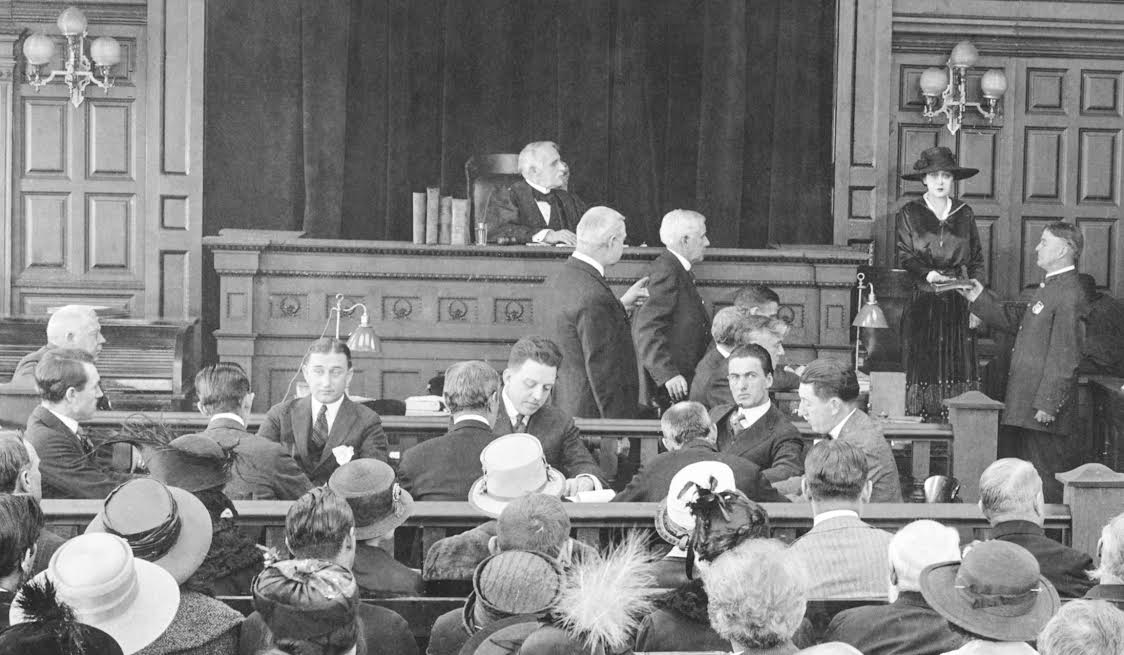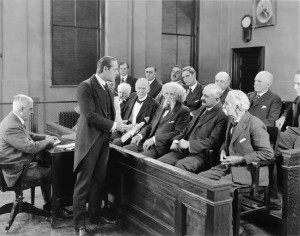How It Should Start – Mentorship not at Law School
For the most part, the majority of lawyers who join the JAG Corps enter the Armed Forces immediately after completing three years of law school. The goal of law school is not to teach students “the law” or “how to practice law,” but rather how to think like a lawyer – to think critically. Except for rare exceptions, law schools do not teach students how to try cases or practice law.

The art of trying cases is intended to be learned at the foot of experienced trial advocates at law firms, or district attorney’s offices, or on corporate litigation teams. Only those lawyers willing to put in long hours and hard work need apply. To be a litigator, a lawyer must want to be a litigator – have the head and heart for trial work.
Law schools provide only a foundation – experience and post-law school training slowly grows motivated new law graduates into trial lawyers, over time, and at the hands of seasoned litigation mentors. These newly minted lawyers initially have “little to no” litigation responsibilities. The responsibilities are gradually increased over time, and young trial lawyers learn the craft in slow steps – first observing trials, taking secondary witness depositions, and handling inconsequential motions hearings. In the district attorney’s office, new lawyers would start as a second or third attorney in misdemeanor court, handling minor criminal infractions, and learning from an experienced chief.

Later, these budding advocates assist a trial team, still with no seat at the table. They begin to depose important witnesses, sit second chair at important motions hearings, and are invited to sit in the well of the court with the trial team (behind the table). In a DA’s office, only after toiling for a few years as a misdemeanor prosecutor, the eager trial advocates are given the opportunity to move to felony court. As a young felony prosecutor, these “adolescent” litigators handle the simple and straightforward cases, mostly under the supervision of their chief prosecutors.
After years of learning the craft of trial work, these “slightly seasoned” litigators begin deposing key witnesses, handling important motions hearings, and sit as an almost equal co-counsel during a trial. Only after proving their metal in this competitive, pressure-filled environment, do litigators earn their spurs – a process that takes several years, and many contested trials. In a DA’s office, the felony prosecutors start taking more complex cases – and over time, taking the lead on moderately significant cases before ultimately earning the responsibility of leading a trial team prosecuting the difficult rape, sexual assault and murder cases.

This is the process of developing trial advocates, litigation attorneys and seasoned criminal trial lawyers.
In the military, and especially in the Army, NOT SO FAST! There is no litigation training track where young lawyers spread their wings under mentorship of experienced litigators with years of trial experience.
How “Litigators” are made in the Army
In the Army, young lawyers are required to first attend the Judge Advocate Officer Basic Course in Charlottesville, Virginia, where they are taught the fundamentals of military law: legal assistance, operational law, fiscal law, claims, contracts, administrative law, and yes there are a few weeks of criminal law training, including an advocacy exercise usually involving a simulated guilty plea. Despite how good the instructors are, it is only a few weeks of criminal law training, and for most of them, it is the only exposure they have had to the UCMJ. Within weeks, these young First Lieutenant judge advocates report to their first duty assignment only months away from their first promotion to Captain.
 When they arrive at their duty station, the Staff Judge Advocate does not assign them to shadow a seasoned litigation expert, in part, because there is no seasoned litigation expert organically assigned to that particular Army post. Instead, these new JAGs are typically assigned to Legal Assistance, Claims or Administrative Law sections, where they get no criminal law mentorship or training. Almost every incoming JAG clamors for that first criminal law assignment as a trial counsel or defense counsel, in part because the JAG Corps views these jobs as “developmental assignments.” Yep, that’s right; the lawyer the Army detailed to defend the criminally accused is usually assigned to that job as part of the overall professional development of the judge advocate, not because he or she has a passion to defend the accused, or because he or she has exceptional trial skills. No, it is part of the overall plan to make that lawyer competitive for promotion later.
When they arrive at their duty station, the Staff Judge Advocate does not assign them to shadow a seasoned litigation expert, in part, because there is no seasoned litigation expert organically assigned to that particular Army post. Instead, these new JAGs are typically assigned to Legal Assistance, Claims or Administrative Law sections, where they get no criminal law mentorship or training. Almost every incoming JAG clamors for that first criminal law assignment as a trial counsel or defense counsel, in part because the JAG Corps views these jobs as “developmental assignments.” Yep, that’s right; the lawyer the Army detailed to defend the criminally accused is usually assigned to that job as part of the overall professional development of the judge advocate, not because he or she has a passion to defend the accused, or because he or she has exceptional trial skills. No, it is part of the overall plan to make that lawyer competitive for promotion later.
In fact, there is an old adage in the JAG Corps that only Captains get to try cases, and while this is not totally true, it does speak to the fact that as lawyers gain experience in the JAG Corps, they leave the courtroom to pursue leadership and managerial jobs. Typically, a judge advocate will spend 18-months to 2 years as either a trial counsel or defense counsel. The ones that have a drive to try cases may get a second tour switching sides – prosecutors become defense lawyers and defense lawyers become prosecutors. The follow-on assignment is for about 2-years. The lawyers who want to try cases after two military justice tours are then required to take non-military justice jobs to become “a broad-based well-rounded judge advocate.” Again, the JAG Corps interest is in growing promotable lawyers, not developing a corps of criminal defense lawyers fully able to protect the rights of the accused and holding the government to their burden. Now these “adolescent” lawyers spend another couple of assignments in jobs such as a chief of client services at a small installation, or as a chief of administrative law at a TRADOC installation. What they are not doing is trying cases and honing their criminal litigation skills. A few lucky ones may find themselves as a Chief of Justice, but that is typically an administrative job concerned about “processing times,” not how cases are tried. You get the picture. There is not a dedicated system to train criminal litigators in the Army, or a litigation career track to provide the criminally accused the best representation possible.
Tragically, what is previously outlined is the “best case scenario” and involves young lawyers who WANT to be in the courtroom. There are an equal number of young lawyers that do not want to ever see a courtroom.

However, since the trial counsel and defense counsel jobs are “developmental” even lawyers who want nothing to do with criminal litigation are assigned as trial advocates. This is the ugly place where no criminal litigation training, meets no trial experience, and has a healthy dose of inexperienced criminal law mentorship combined with a lack of motivation and no desire to try cases. The outcome is certainly not the best interest of anyone facing court-martial. I have personally observed several young Captains assigned to criminal law litigation jobs who were terrified of the courtroom, and almost always the senior leaders were aware of it and did nothing about it – they did not want to stigmatize the lawyer by removing him or her from the military justice job too early. Shockingly, it was perfectly okay to allow justice to suffer.
Here is where it gets even stranger. One would think that at least there are experienced criminal law mentors guiding these young lawyers through their first tour as they learn military justice. Many times that is not the case. Assignments are not made by the criminal law practitioners who see the need for actual trial experience; rather they are made by the JAG assignments branch. The assignment managers match people with jobs to fill slots. The result is sometimes that a “square peg” is jammed into a “round hole.” Knowing that criminal law is one of the mandatory “developmental” jobs, senior Captains who have not served in military justice billets are often slotted in those criminal law mentoring jobs – because to be competitive for Major, you must have criminal law experience – so the assignment diversity is “block is checked” at the expense of the criminally accused.
While there are a handful of truly experienced, dedicated, criminal defense litigators in the Army, they are the exception rather than the rule – because the system is created to prevent specialists and to breed generalists. In the end, the Army reaps what it sows.
How to Know the Experience Level of the Detailed Counsel
It is virtually impossible for the accused to know the experience level of his or her detailed counsel without asking questions. Remember, most JAG lawyers are promoted to Captain within six-months after joining the Army. I was commissioned as a First Lieutenant on July 3, 1998, and was promoted to Captain on January 1, 1999 – less than six months! With their freedom, family and financial future on the line, those facing a court-martial should ask their detailed defense counsel probing questions to determine his or her level of trial experience. Probing questions that should be asked include the following:

- When did you graduate from law school?
- When were you licensed to practice law?
- How many times did you take the bar exam?
- Did you have any criminal trial experience before the Army? If so, what did it entail?
- How long have you been a defense counsel?
- Were you a trial counsel or prosecutor before becoming a defense counsel?
- Have you tried any contested courts-martial to a panel? If so how many?
- How many contested trials to a panel have you defended?
- How many times were you the lead counsel, not second chair, in a contested court-martial?
- How many cases like mine have you tried to a panel?
- How many times have you fully acquitted a client at a contested court-martial before a panel?
- How many times have you defended a service member at a guilty plea?
- Do you know what your next assignment is yet? If so, what is it? When do you PCS?
- What continuing legal education classes have you attended that focused on defending service members at a court-martial?
Be sure to ask the questions about contested courts-martial to a panel. Many military defense counsel will talk generally about their trial experience, lumping all court appearances together; guilty pleas, mixed pleas, contests to a military judge alone and contests to a panel as if they all are the same thing. They are NOT. Knowing the system is designed to provide all judge advocates “broadly based” knowledge rather than developing specialized criminal litigators, the criminally accused should not leave their future to chance and the “luck of the draw” for a detailed defense counsel.
The accused has the right to know about the defense lawyer the Army has detailed to represent him or her in a court-martial and make an informed decision whether to request the Army for another detailed counsel, request an Individual Military Counsel or hire an experienced civilian defense counsel at their own expense.
Will M. Helixon
Top Law School Advocacy Programs